If you’ve ever found yourself asking the question, “Why does my RV battery keep dying?”, then this post is for you. And actually – this post is for every RVer with a battery! Proper care and maintenance is important for all sorts of reasons, not the least of which is to preserve the integrity of your RV’s battery so that it performs well for you for as long as possible. And let’s face it – batteries are expensive, and no one wants to have to replace them due to a simple lack of maintenance or care.
So, with this post, we’re not only hoping to help RVers whose batteries keep dying but anyone who could use a few good tips on how to keep their RV batteries in tip-top shape and performing optimally for as long as possible.
Let’s get to it!
So, Why DOES My RV Battery Keep Dying?
There are a number of potential answers to this question, and we’re going to lay them out below, followed by our tips on how you can avoid being someone who has to ask this question.
First, the most common reasons why your RV battery keeps dying:
You May Not Be Fully Charging Your Battery
You may have heard that overcharging your battery can shorten its life, but in fact, undercharging your battery can do the same, due to sulfation.
Sulfation, the accumulation of lead sulfate in your battery, not only shortens the life of your battery but can also completely destroy it.
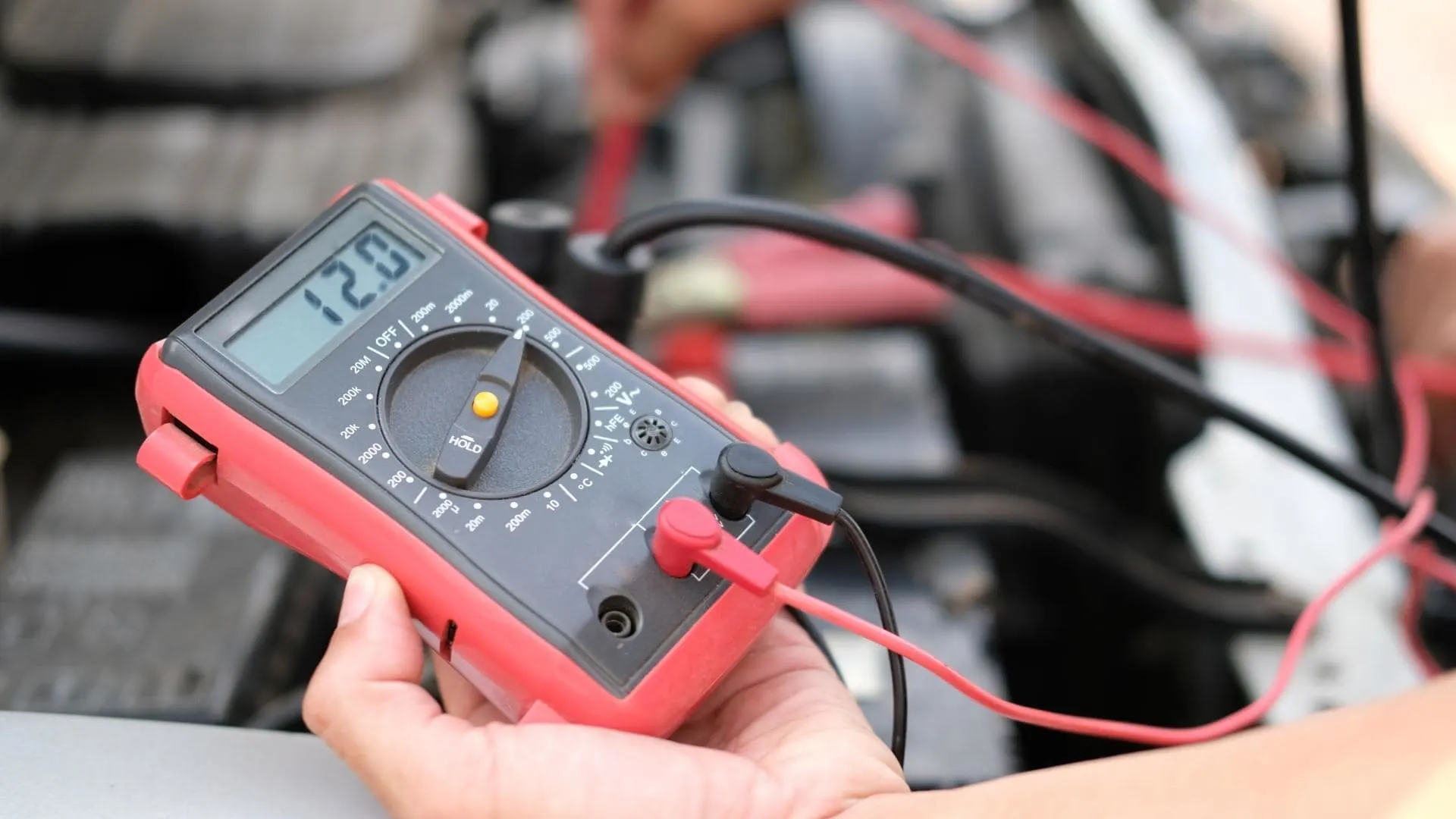
Undercharging a battery can cause sulfation, the accumulation of lead sulfate on the battery’s plates. This can not only decrease the life of your battery, but may even destroy it completely.
Now – it’s important to note that this applies only to lead-acid batteries and not to lithium batteries. Lithium batteries aren’t damaged by undercharging. (See more in our post entitled, “Are RV Lithium Batteries Worth It?”)
However, it’s also important to note that this is one of the main reasons why a solar setup works best with lithium batteries as opposed to lead-acid batteries. Quite often, (due to circumstances outside your control, like the weather), your RV solar panels may not be able to fully charge your batteries. If your solar system is being used to recharge your lead-acid batteries, over time, the lack of complete charging can damage them. This could be a reason why your RV battery keeps dying.
Important: When you store your RV or store a battery, always fully charge a lead-acid battery prior to storing. Storing a partially discharged battery is asking for battery damage (and possibly battery loss). Always fully charge your RV batteries prior to storing.
Your Battery Is Thirsty!
Any flooded lead-acid battery requires water for proper performance (and in fact for survival), and dehydrating your battery will most certainly damage it.
When you have a battery that requires this type of maintenance, you really need to be vigilant about staying on top of it. You need to cautiously pop the caps off of your flooded lead-acid battery and check the fluid levels. The plates on your battery should never be exposed. If your battery is suffering from a lack of water, you’ll need to add distilled water before charging it (using plain tap water could seriously damage the battery).
This is a very common reason why an RV battery keeps dying, and it’s all due to a lack of proper maintenance.
We made a video back in 2011 in which we demonstrated how to properly service, maintain and equalize the 6-volt deep-cycle golf cart batteries in an RV. We’re posting it here for anyone who might be interested in seeing the process in action.
If you’ve got a lithium or AGM battery, you’re free of this type of maintenance. You won’t even find the little caps on those batteries allowing you to add distilled water.
However, you need to know that an AGM battery is still a lead-acid battery which means it still requires being fully charged (and, depending on the manufacturer, even equalized) from time to time.
AGM batteries are susceptible to sulfation if they’re allowed to go nearly or completely dead, (under around 10.5 volts). However, proper equalization (again, following the battery manufacturer’s guidelines) can often resuscitate them to their near-original capacity.
Sulfation Has Occurred
Sulfation, the build-up of lead sulfate crystals on the surface of a battery and/or inside the battery’s lead plates is very common, but proper battery maintenance can delay sulfation or make it less likely to occur.
As we noted above, sulfation is generally a result of repeated undercharging, but it can also occur if you store your battery at high temperatures (generally above 75 ℉). Sulfation will not only reduce the battery’s capacity and performance, but it can also be a reason why your RV battery keeps dying, as it frequently leads to early battery failure.
We remind you that sulfation is only an issue with lead-acid batteries.
You Have a Parasitic Battery Drain
If you have a parasitic drain on your battery, you will very likely experience the symptom of a battery that keeps dying.
In essence, a parasitic battery drain occurs when your electrical system continues to pull energy from the battery even when everything is turned off (including the engine). When everything is turned off, but electricity continues to be pulled from the battery, you very likely have a parasitic battery drain.
Now, this happens to some degree with regularity. Some electrical components such as computers, radios, and other “electronic” gadgets have internal clocks that continue to draw electricity in order to stay accurate. But when the drain goes beyond what’s normal for a vehicle or electrical system, that parasitic drain can easily cause your RV battery to keep dying. This impacts your battery’s performance and longevity.
To diagnose a parasitic drain, you’d want to use a multimeter to identify the systems that are draining power from your battery.
- Measures both ac & dc current up to 400 amps, ideal for vehicles, rvs, marine boats & etc
- Ac/dc voltage, current, resistance, frequency, continuity, duty cycle & diode check
And if you want to ensure that, when stored, there’s NOTHING pulling power off your RV’s battery, you could install a battery terminal disconnect switch, like this one:
- Ideal for car, truck, boat or RV battery
- Convenience: knob type, easy to install & simple to use. Loose / twist of the knob, then power will cut.
Just be sure that whatever disconnect switch you install is rated to handle the maximum flow of current you could see coming from your battery.
Your Battery Is Self-Discharging
Some amount of self-discharging is actually a characteristic of all batteries. However, poor battery care can exacerbate the increased self-discharge of your battery and can lead to permanent battery damage.
With that said, the age of your battery, regular cycling, and elevated temperature all increase battery self-discharge.
Many RVs use lead-acid batteries and they actually have relatively low self-discharge rates. (The loss is said to be around 5% per month.) But, as the battery ages, sludge from the byproducts of the charge/discharge cycle can accumulate in the sediment trap. Or repeated undercharging can leave lead sulfate crystals that can span the gap between the battery’s lead plates. This both can cause “soft shorts” or “micro shorts” (small contacts between electrodes) and this can lead to higher rates of self-discharge.
Self-discharge of a battery can’t be completely avoided, no matter what you do. Older batteries self-discharge more due to their age, and poorly manufactured batteries have higher self-discharge rates from the beginning.
However, you can lessen your battery’s self-discharge rate by being mindful of keeping it out of the heat. (A battery’s self-discharge rate doubles for every 18° F its temperature increases.)
Your Battery Is Overcharging
Another possible answer to why your RV battery keeps dying is overcharging. This is usually a matter of user error (for example, using a battery charger incorrectly). Overcharging could also be the result of an alternator that isn’t working properly to regulate the battery charge.
It could also be due to using improper charge voltage settings or leaving a charger connected to the battery for too long.
Overcharging your battery can cause corrosion of the positive battery plates, increased water consumption, and complete battery failure. Worse yet, an overcharged battery can overheat to the point of melting or swelling. If hydrogen (a highly flammable gas that’s a byproduct of the charging process) starts to accumulate inside the battery’s sealed cells, it can cause the casing to swell or lead to gas leakage. One tiny spark could ignite the gasses causing an explosion.
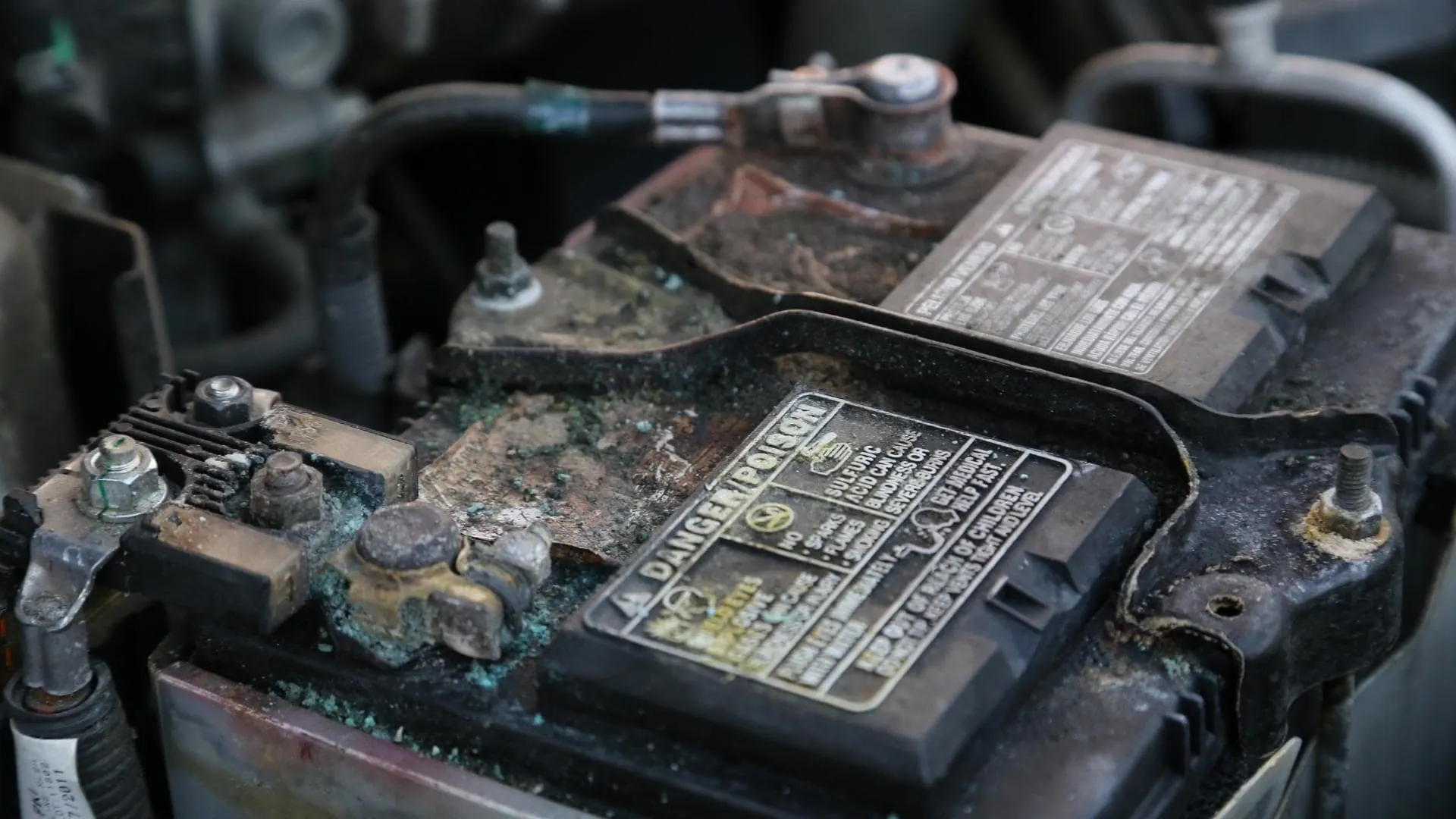
Battery corrosion, or any kind of battery damage from poor maintenance, can destroy a battery – or even lead to an explosion.
Once again you can test your battery using a digital multimeter to see if it’s overcharged. Follow these steps to test your battery:
- Turn your engine on and run your RV at idle.
- Connect your multimeter to the battery terminals. A properly charged battery will show around 12.6 volts.
- Turn on the air conditioner, lights, and radio. You should now see a reading of around 14 volts. If your battery is showing more than 14 volts, it’s overcharging.
Your Battery Is Damaged/Flawed
Another potential reason why your RV battery keeps dying could be that the battery is damaged or flawed in some way. If you have a damaged/flawed battery, replace it immediately.
How Can I Properly Maintain My RV’s Lead-Acid Battery?
Fortunately, there are a number of things we can do to properly maintain a lead-acid RV battery, making a dying battery less likely.
Avoid Deep Discharges
Avoid deep discharges as they result in significantly shortened battery lives.
If you’re using your battery under a heavy load, you’ll want to take short (1 to 2-hour) breaks to briefly recharge it. This will help to prolong the life of the battery.
If you’re storing your RV, you’ll want to take proper care of the battery/batteries – and be mindful of the temperatures to which they’ll be subjected during the period of storage.
You’ll also want to monitor your batteries as carefully as possible, and this is where a good RV battery monitor comes into play. (If you’re in the market for a quality RV battery monitor, feel free to check out our post on the best RV battery monitors as well.)
Fully Charge Your Battery Before Storing
Before you store your RV or your RV’s batteries, be sure to fully charge them. You always want to store a lead-acid battery after it’s been fully charged.
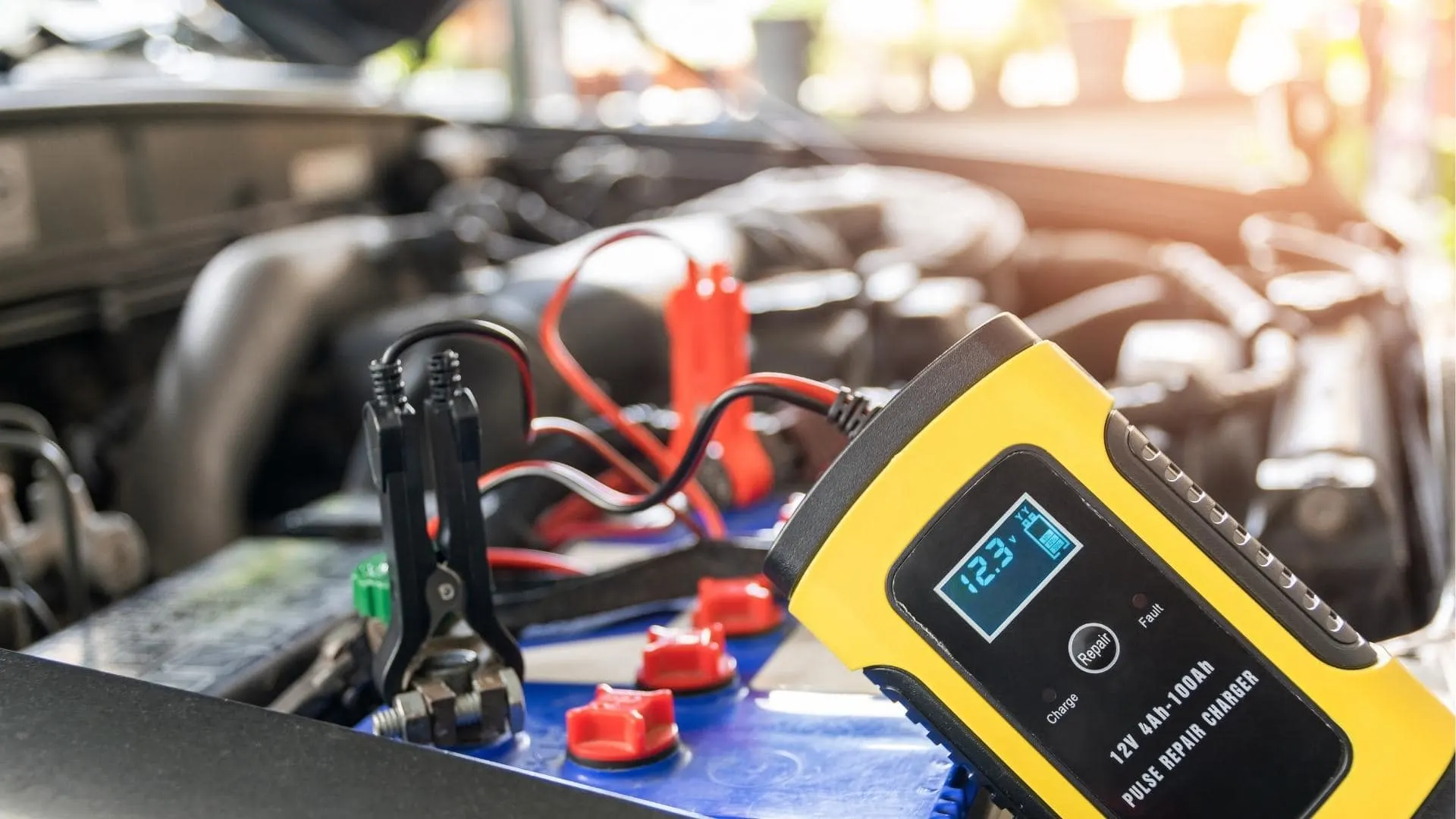
Before storing a lead-acid battery or your RV, be sure to fully charge the battery.
Store Your Battery Properly
Store your batteries in a cool place in summer, and in winter be sure to store your fully charged batteries where they won’t freeze, as we noted in our post on RV winterizing tips.
And finally, even when stored, you want to check your batteries monthly to see if they need water replenishment. Remember that the plates shouldn’t be visible (more about that coming up).
Use a Battery Tender
A battery tender has safety features that prevent overcharging, so using a battery tender is a good idea. You can also use a battery tender when you bring the battery out of storage. While it will have lost a bit of current from lack of use, a battery tender will prevent leakage while keeping the battery from dying.
Maintain Proper Electrolyte Levels
Be sure to regularly check your battery’s electrolyte (liquid) levels and never allow the electrolyte to drop below the top of the plates. If you can see the plates, your battery is thirsty (and damage is being done), because when the plates are exposed, they become irrevocably damaged and, eventually, become completely inactive.
If the fluid level is low, add just enough distilled water to cover the plates BEFORE fully charging the battery. Once charging is complete, finish filling with water to the correct level, which is generally marked by a visible fill line (or until the liquid level just touches the bottom of the neck of the opening).
Remember to only use distilled or deionized water for your batteries. Any other water will bring minerals that could permanently damage the battery.
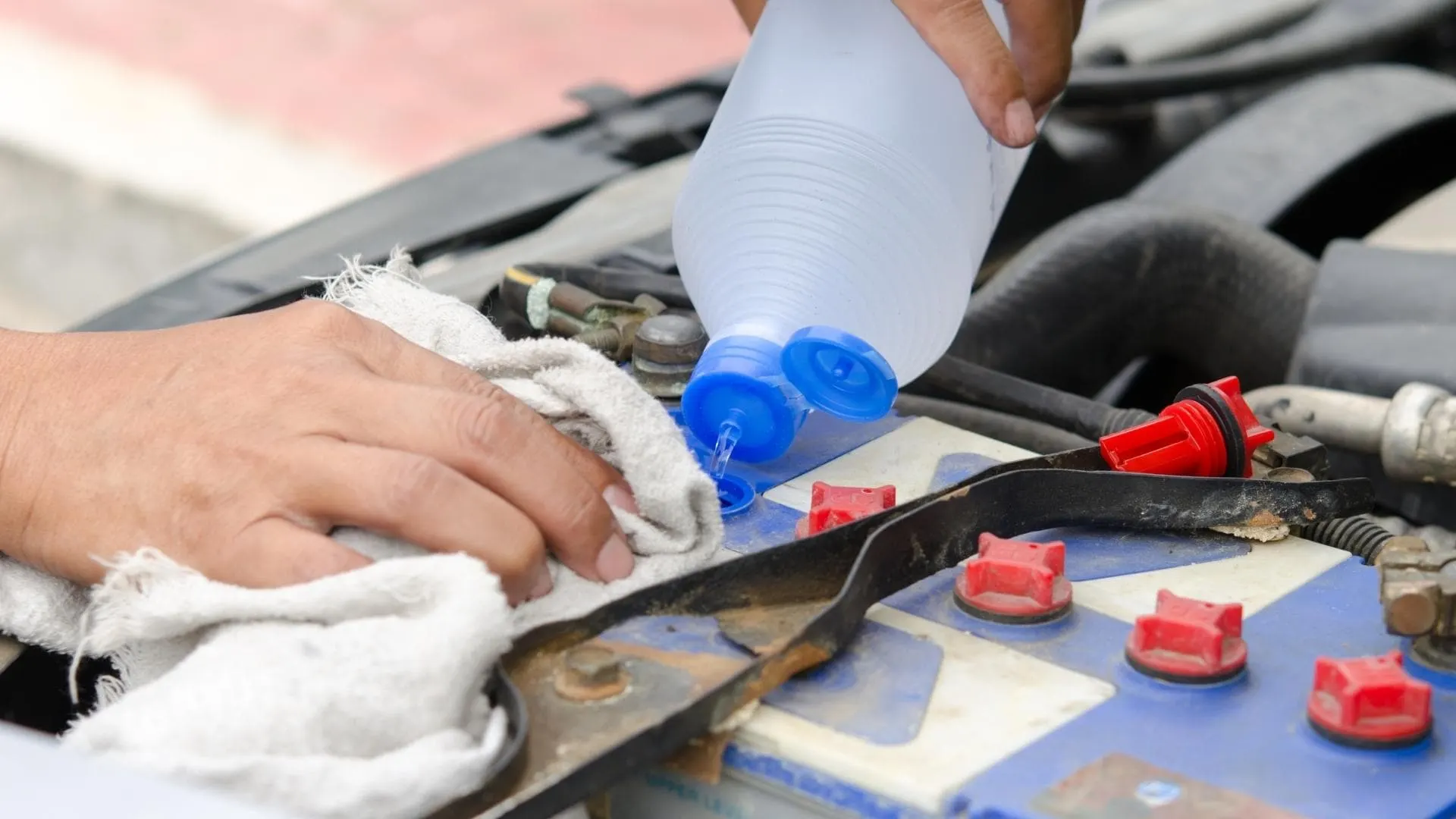
Regularly checking the electrolyte levels of your flooded lead-acid batteries is important. Remember to only use distilled or deionized water to replenish the fluid as needed.
Don’t Allow Your Battery to Drop Below a 50% Charge
This doesn’t apply if you have lithium batteries. But if you don’t, be sure not to allow your batteries to drop below 50% before recharging them. It’s good to get down to 50% every once in a while. You need to do that. If you don’t, and you consistently recharge your batteries before they’ve been drained down to 50% state of charge, you can actually reduce the lifespan of the battery.
However, if you allow your lead-acid batteries to fall BELOW 50% state of charge, the internal resistance will increase, and your batteries won’t hold a charge due to the depletion of electrolytes. Doing this will significantly shorten your battery’s lifespan.
Don’t Allow Corrosion to Build Up
Battery terminals corrode over time, but regularly inspecting and cleaning them will prolong the life of your battery.
The electrolyte in lead-acid batteries contains sulfuric acid, which is highly corrosive. During the charging cycle, it’s normal for some of that acid to be expelled through the vent openings in the caps, which then corrodes the metal of the battery terminals.
It’s important to remember that corrosion on those terminals will add to resistance as electricity flows through, increasing the drain on your battery’s power. So, be sure to keep an eye on your battery terminals to keep your battery healthy. If you see that they’re beginning to corrode, it’s a good idea to clean them with a product like this (which includes a color-changing indicator to let you know when you’ve neutralized all the acid):
- Fleet and Vehicle Maintenance
- Manufacturer: Crc
Or, you can mix baking soda (readily available at grocery stores) with water and spread that on the corrosion. The baking soda will react with the acid (you’ll know, because it will bubble), neutralizing it. Rinse the solution off carefully with plenty of fresh water and continue re-applying it until the bubbling stops.
When Is It Time to Replace My RV Battery That Keeps Dying?
In general, the lifespan of your RV batteries will be determined by the way you care for and maintain them. Managing the proper charging and discharging of your batteries is a very important part of prolonging their life.
If you take care to make sure your batteries never discharge below 30% of their maximum charge (i.e. only drain them from 100% charge down to 70% state of charge), for example, they’ll have a 50% longer lifespan than they will if you allow them to completely discharge. If you’ve been regularly allowing your battery to discharge deeply, and your battery keeps dying, it’s probably time to replace your battery.
The lifespan of your batteries is also affected by the temperature in which they operate. Lead-acid batteries tend to do best in an environment that stays somewhere between 50℉ – 75℉ (that’s 10℃ – 25℃). Of course, this isn’t always possible, but be aware that the longer a battery operates outside of this general range, the more the lifespan of the battery will be impacted.
Extreme heat and extreme cold have the greatest impact and can lead to a dramatic reduction in the life of the battery. If your battery has been subjected to either extreme heat or extreme cold, and your battery keeps dying or doesn’t hold a charge as it should, it’s probably time to invest in a new battery.
If your battery is 4-6 years old and keeps dying, its age is showing and you’ll do well to replace it.
And finally, if your battery no longer holds a charge or is damaged – or if you see corrosion accumulating regularly, you should replace your battery immediately.
Have a look at our post on how to replace RV house batteries, or watch our YouTube video and follow along with us as we show you how to replace deep cycle RV house batteries.
Have You Experienced an RV Battery that Keeps Dying?
Have you run into the problem of an RV battery that keeps dying? What was the issue in your case? We’d love to hear about your RV battery-related experiences.
Geek Out with Us Every Week
Join our newsletter to learn about all things RV-related. Every week we offer free tips, tricks, product reviews, and more to our online community of RVers. So, whether this is your first time on the road or you’re a seasoned expert, we’d love for you to geek out with us!


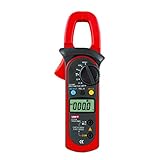


Jeff Mullins
Wednesday 15th of November 2023
I am having a problem with my rv battery draining quite quickly. We like to watch DVDs on the TV. We have two parallel 100 ah batteries about 1 year old.
We will start at full charge and have most everything else turned off (fridge, heater, etc;) The battery voltage will begin at an indicated 13.5v; After 5-6 hours of running the TV and DVD player continuously the voltage will drop to 10.5 volts and actuate the low voltage alarm on the inverter. When the TV and inverter are turned off, the indicated voltage rebounds, sometimes to 12.5 other times to 11.5 or so.
The batteries are lead-acid and sealed. We keep the rv plugged in when parked which keeps the batteries charged.
Your thoughts?
TheRVgeeks
Friday 17th of November 2023
Hi Jeff! Sorry to hear about your trouble. From your description, we do indeed have some thoughts (in no particular order):
It sounds like your batteries are being overtaxed. From what you said, it sounds like you've got two 12V batteries (since they're wired in parallel with positive-to-positive and negative-to-negative, right?)... which, even though they're 100Ah each (for 200Ah total) aren't likely that great of "deep cycle" batteries. That's because 12V batteries need to have twice as many cells in them to generate 12V. So each cell is smaller than they would be in an equally-rated 6V battery. Those smaller cells mean less lead... and less resistance to damage from repeated deep cycling. So... if you're regularly running the TV & DVD player together for 4-6 hours (are they 12V DC? or are the 120V AC running off the inverter... which is increasing the amount of power needed, since the inverter isn't 100% efficient) could be using a significant enough portion of the available power that they're being drained below 50% every 24 hours, which shortens their life each time. With the voltage starting at about 13.5V without heavy load... that sounds like they've been recently charged (from shore power, generator, or a solar array). But, if not, then that could also be an indication of an aging/failing battery. We'd suggest equalizing the batteries to try and recover their capacity... BUT (and a very important but) since you mentioned that they're SEALED lead acid batteries... we'd caution you to check with the battery manufacturer to confirm whether or not YOUR batteries can be equalized. Because the equalizing process involves overcharging the batteries, a lot of hydrogen gas is produced. Which, with a sealed/maintenance-free battery, can result in over-pressurizing the battery case and can lead to cracking or an explosion! You also mention that you keep the RV plugged in when parked... which means it's possible that your RV's battery charger is failing or misconfigured, leading to improper charge cycles that are prematurely aging the batteries and ruining their performance (either by overcharging them and boiling off electrolyte or by UNDERcharging them and leaving sulfur from the electrolyte bonded to the lead plates as lead sulfate: What Causes RV Battery Corrosion + 7 Tips to Prevent It). It could be important to confirm whether or not the battery charger is working correctly... because, if it's not, replacing your existing batteries with new ones could just be throwing good money after bad. The failing charger is going to ruin the NEW batteries, too.In order to understand how much power you need to make it through between fully recharging, you'd be best served by installing a battery monitor kit (a BMK - you install a shunt between the batteries and the loads, allowing the BMK to monitor the flow of electricity out of (draining) and into (charging) the batteries). The least expensive option would be a Victron SmartShunt, which allows you to use an app on your smartphone to connect via BlueTooth with the shunt to see power usage, battery state of charge (i.e. the battery is at 82% of it's maximum charge), etc. Havint that in place will allow you to keep an eye on your power usage... and will help you to confirm whether or not the batteries you have are dying... or if your charger is working correctly (get a good view of the exact battery voltage during the charge cycle to be sure it matches what your battery manufacturer states the different targets for Bulk, Absorb, and Float are), etc.
Then, with that info in hand, you'll be better informed to determine what is the best path forward. Do you just need to replace the existing batteries (and, with the BMK in place have a better window into their health so you don't drain them too much)? Or do you need to consider going to a different battery setup (like 2 x 6V Deep Cycle batteries wired in series to be a single, larger, 12V setup... or maybe, if you've got the room, could you upgrade to 4 x 6V batteries wired as two pairs in series... that are then wired in parallel)? Or, depending on how often you're off-grid... maybe upgrade to lithium batteries (check out: Are RV Lithium Batteries Worth It?, 3 Misconceptions About Lithium RV Batteries, and RV Battery Guide: House, Chassis, Lithium & More)?
Sorry for how long this is... and that there's not just a simple answer to your problem... but we hope this helps get you on track.
Terry Carbary
Friday 7th of July 2023
I have a 1993 Ford/ Tioga C class, Motor dies so often it is unusable. Towed into repair shop several times. Best guess is fuel delivery issue, replaced fuel pump, ECU, Fuel filter. Last camping trip was foiled 10 miles down the road, engine failed as if the key was switched off. Towed to a mechanic shop, looked at it for 4 hours, ended up finding no issue, did not charge me and I drove it home. My most recent theory is fuel relay, power distribution box has 4 relays, Electronic Engine Control, Horn, blower ( heater ). Dead in the yard most of the time. I pulled 2 relays and swapped them ( fuel / horn ). It started right up! Ah-ha, then tried starting 2 hours later, no go. In reading your battery article, gets me thinking on an alternative theory. I have not bother with replacing house battery, why bother. I have a brand new deep cycle battery for the engine. Could a dead / low house battery be sucking the power from the engine battery to the point of bringing down the relays to malfunction and cut fuel delivery?
Clarence
Monday 17th of July 2023
@Terry Carbary,
This could be caused by your keys. If you have multiple keys on your keyring , the downward force that the keys cause could cause the key to rotate backward (due to a weak spring in the ignition). This was a major issue with Chevy vehicles in the mid 2000's.
1st try just the key by itself 2nd replace ignition spring
Just some thoughts.
TheRVgeeks
Saturday 8th of July 2023
Sorry to hear about this, Terry! Intermittent problems like this are such a pain to locate and correct! With a gas engine, it could be any one of the three components needed for combustion: fuel, air, or spark. You mention that you have a "new deep cycle battery" for the engine. Deep cycle batteries are intended for longer-term, lower-current draw loads like on the house portion (lights, fans, etc)... batteries for starting an engine need to be able to supply a quick, high-power burst... and then stay fully charged from the alternator. If you really do have a "deep cycle" battery for the engine, it's possible there may be some problem related to that. However, if each time you go to start the engine the starter turns without problem, the battery probably isn't the issue. If it doesn't even TRY to start when you turn the key, but other times it fires right up, we think you're on the right track with thinking it's an electrical issue. But we'd suspect faulty (rodent chewed?) wiring or possibly the ignition itself. Especially if the engine just shuts itself off while you're driving, as if you'd turned off the key. That DEFINITELY sounds more like wiring/ignition and not the battery.
Dana Miller
Tuesday 27th of June 2023
I have a 2003 Fleetwood Terra. My generator recently quit running (Onan) and gives me code 32. That's not why I'm writing. I suspect an issue with my auxilliary batteries (2-6volt). They are brand new (5 weeks old) but have discharged completely already. I have a battery switch that has been in the off position. I hear the click when I turn it on. I cannot find any 'electrical parasites' considering even when parked at home I have a shore connection. Any thoughts?
Smitty
Monday 1st of May 2023
Another tip is to exercise you battery bank. Living on Float for long periods of times, can allow the sulphation to build up, both Wet and AGM. We schedule every 6-8 weeks (Depending upon the situation, we'll go out to 8 weeks, but usually schedule this every 6 weeks.) We turn off the CB at Shore Power, and run the bank down to 65-75% SOC. We then turn CB at Shore Power back on, and let it go thru the full Bulk/Absorb/Float/Resting phase. This 'stirs' the lead or the mats a bit, and helps prevent sulfation build up.
That was advice from an AGM Tech Support gent, when I was reviewing settings with him between our Solar Controller and Inverter/Charger. He also recommended Conditioning/Equalization runs on a yearly basis, followed by testing battery capacity to map out the health of the bank.
I'll admit, and so did this gent, that this will use up some of the Life Cycles of your batteries. And, if the bank of batteries is used frequently, cycling down/up, while boondocking - the 'exercise' is not needed.
And I'll also admit that opinions by the Battery Clan, vary on if this is needed or not.
Been doing this now for about 12 years, and will continue to do so. Which is my choice. I make the suggestion, and never push this on others:)!
Best - Smitty